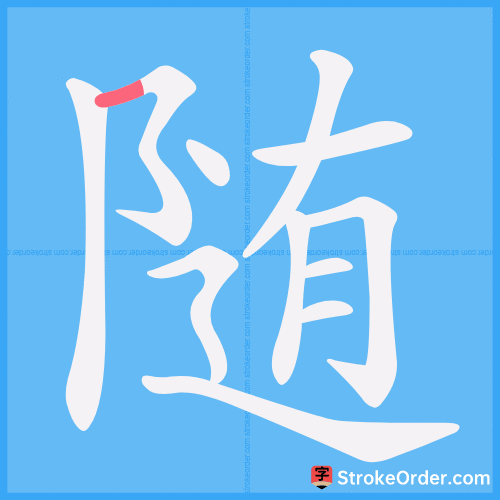随 Stroke Order
Animated Stroke Order of 随

Stroke Order Diagrams for 随

Step-by-Step Handwriting Guide for 随

Learn to Write Chinese Characters with Video Tutorials
Watch the video of writing the Chinese character "随", learn the correct stroke order (笔顺) of the character "随", and master the standard way of writing the character "随".
Free Printable Handwriting Practice with Stroke Order: 随
Printable Writing Practice Worksheet of "随" in Portrait Orientation (Tian Zi Ge)

Printable Writing Practice Worksheet of "随" in Landscape Orientation (Tian Zi Ge)

Information of 随
Pinyin
suí
Radical
阝
Strokes
11 strokes
Usage
★★★★★
Definition
to follow / to comply with / to allow / (surname)
随
súi
Definitions:
1. 跟着: To follow.
- Example: 随从 (to follow), 随员 (follower), 随葬 (to follow in burial), 随即 (immediately), 随行 (to accompany), 随身 (to carry with oneself), 随喜 (to rejoice in others’ happiness), 随波逐流 (to flow along with the current), 随行就市 (to follow along to market).
2. 顺从,任凭: To comply with; to let someone do as they please.
- Example: 随意 (to do as one wishes), 随口 (to speak casually), 随宜 (to adapt accordingly), 随和 (easygoing), 随俗 (to conform to customs), 随笔 (casual writing), 随遇而安 (to be content with whatever comes).
3. 顺便,就着: Conveniently; incidentally.
- Example: 随带 (to bring along), 随手关门 (to close the door casually).
4. 像: To resemble; to look like.
- Example: 他长得随他父亲 (He resembles his father).
5. 姓: A surname (also serves as a family name).
- Example: 随 (as a surname).
Additional Information:
动 (Verb):
1. 形声。从辵 (Sound character; derived from the character "辵").
2. 同本义 (The same as original meaning: follow).
3. 依顺;依从 (To comply with; adapt to).
4. 听任某人自愿去做 (To let someone do as they please).
5. (方)相似,与某人、物、事相像 (To look like or resemble someone or something).
6. 接着,随即 (To continue or follow immediately).
7. 按照;依据 (According to).
名 (Noun):
1. 六十四卦之一,震下兑上 (One of the 64 divinatory symbols).
2. 中国周代国名 (Name of a state during the Zhou Dynasty); 姬姓 (Surname Ji). In the late Spring and Autumn period, it was a vassal of the state of Chu, located in present-day Hubei Province, Suixian County.
If you marry a chicken, follow the chicken (idiom); A woman should follow whatever her husband orders. / We must learn to accept the people around us.
Input Method for 随
Pinyin
sui2
Wubi
bdep
Cangjie
nlykb
Zhengma
ygqw
Four Corner
74232
Unicode
U+968f
Same Pronunciation Characters